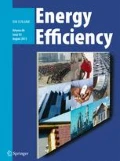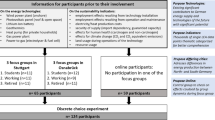Abstract
This article is based on the findings of the BEHAVE Project (Evaluation of Energy Behavioural Change Programmes) which was supported by the European Commission under the EU Intelligent Energy–Europe (IEE) Programme. The project started with a review of behavioural theories and their applicability in the development and evaluation of energy-related behavioural change programmes, progressed to a case study analysis and finished with a publication of guidelines for programme developers and policy makers. This paper concentrates on the results of the case study analysis and the recommendations arising from it. In the case study analysis, information was collected on almost 100 cases aiming at behavioural change in energy use from 11 European countries. More detailed information was collected on 41 cases which were subject to meta-analysis to identify success factors and weak points and to gather information on the current evaluation practices in such programmes. The meta-analysis was carried out in five phases: context (pre-planning), planning, implementation, monitoring and evaluation. Planning and evaluation were recognised as two of the most critical phases. Many of the programmes operated with quite formal plans but were typically not based on scientific theories or evidence. In many cases, there was lack of market segmentation; the goals were not targeted and the programmes tried to offer “everything to everybody”. A multitude of ex-post evaluation methods for programme impacts were reported ranging from participant surveys, testing and comparison with control groups to top–down method evaluating the impact of several programmes focusing on the same target group. Process evaluation (25 cases) was slightly less common than impact evaluation (29 cases). Evaluation of the cost-effectiveness of the programmes was a rarity, most likely due to difficulties in quantitative impact evaluation.
Similar content being viewed by others
Notes
Infotainment is a television program that presents information (as news) in a manner intended to be entertaining. (Merriam-Webster Dictionary)
References
Ajzen, I. (1985). From intentions to actions: A theory of planned behaviour. In J. Kuhl & J. Beckman (Eds.), Action-control: From cognition to behaviour (pp. 11–39). Heidelberg: Springer.
Dahlbom, B., Greer, H., Egmond, C., & Jonkers, R. (2009). Changing energy behaviour—guidelines for behavioural change programmes. The BEHAVE project, intelligent energy Europe programme. Spain: Instituto para la Diversificación y Ahorro de la Energía.
Guagnano, G., Stern, P., & Dietz, T. (1995). Influences on attitude behaviour relationships—a natural experiment with curb side recycling. Environment and Behaviour, 27(5), 699–718.
Heijs, W. (1999). Huishoudelijke apparaten: Gewoontegedrag en Interventiemogelijkheden (Household energy use: habitual behaviour and possibilities to intervene). Research for Novem e.g. Eindhoven Technical University. March 1999.
Stern, P. (2000). Toward a coherent theory of environmentally significant behaviour. Journal of Social Issues, 56(3), 407–424.
Stern, P., Dietz, T., Abel, T., Guagnano, G., & Kalof, L. (1999). A value-belief norm theory of support for social movements: the case of environmental concern. Human Ecology Review, 6, 81–97.
Violette, D. M. (1995). Evaluation, verification, and performance measurement of energy efficiency programmes. Report for the International Energy Agency. Boulder: Hagler Bailly Consulting, Inc.
Author information
Authors and Affiliations
Corresponding author
Additional information
The article is presented on behalf of the EnR (European Energy Network) Working Group on Energy Related Behaviour Change. It was first presented in the 2010 International Energy Programme Evaluation Conference (IEPEC), Paris, 9–10 June 2010.
Rights and permissions
About this article
Cite this article
Gynther, L., Mikkonen, I. & Smits, A. Evaluation of European energy behavioural change programmes. Energy Efficiency 5, 67–82 (2012). https://doi.org/10.1007/s12053-011-9115-9
Received:
Accepted:
Published:
Issue Date:
DOI: https://doi.org/10.1007/s12053-011-9115-9




